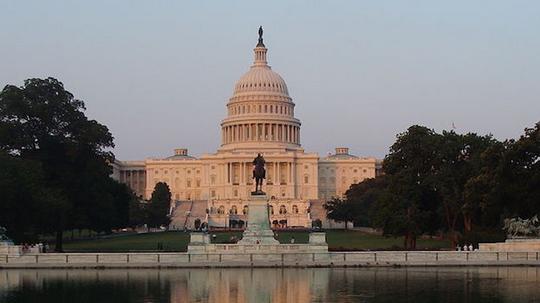
Ajit Verghese is a founder and general partner at humble ventures, a D.C. and NYC-based co-operative and incubator for local startups. This post originally appeared on humble's Medium page.
Recently I was asked for my perspective on the Republican healthcare bill, called the Better Care Reconciliation Act (BCRA), and its effects on entrepreneurs. I outlined my thinking and turned it into the below post. I’m not an expert by far. But I try and pay attention to what is happening in the health space, and I work with some corporations, tech companies, health systems and startups who are all trying to solve problems across the health ecosystem. Here’s my point-of-view on the bill—for what it is worth—and where we’re at overall.
From what I have read, this healthcare bill doesn’t improve upon the existing model that is currently in place.
More people are estimated to be left uninsured based on the CBO score of this bill versus the current legislation. When there are fewer options for people to take care of their health needs and those of their families, there ends up being a smaller population of insured people ?— ?that makes it harder to distribute risk and cost.
We are all guaranteed to need some sort of care across the continuum of our lives? — ?for ourselves and our families. Whether we are having children, taking care of ourselves or our families and aging parents? — ?the cost, access, and options around healthcare affect us all.
I think this healthcare bill is going to be bad for a lot of people, especially entrepreneurs. The false argument is that entrepreneurs are young rockstars that don’t get sick or need insurance at their age. While we assume that entrepreneurship is a young person’s game, there’s a bunch of research (Kauffman Foundation,State of Startups report from First Round Capital, Experian SMB report) that says the average age of an entrepreneur is 40+ and the average age of a small business owner is 50.
The ACA currently gives people more options to purchase affordable care outside of a traditional W2 job, which provided them with flexibility and allows them to have more options to support a critical part of their existence. This provided them with mobility and options for themselves and more importantly for their families. You could leave your job to pursue entrepreneurial ambitions while still protecting your ability to have affordable care for your family. You could make different choices about how you were employed. If you had a small, fledgling business your employees had options. You could participate in the sharing economy. The future of how we work is changing ?— ?and entrepreneurial activity is very much a driving force.
We should be putting in place infrastructure that makes entrepreneurship easier for all.
At humble, we believe that entrepreneurship can be a driving force for powerful change and that a diverse group of entrepreneurs best represents the needs of the market. We should be putting in place infrastructure that makes entrepreneurship easier for all. While it has never been easier to start a company using shared knowledge, infrastructure, and resources, you also need to account for health infrastructure ?— ?and we’re not keeping up. The ACA helped create the basic health infrastructure to provide coverage to many at scale? — ?it wasn’t and isn’t perfect. V1.0 was the beginning of a long journey to build a healthier society. But we’re in need of an upgrade that gives us improved experience. Not one that takes a few steps back and makes it harder on us.
Let’s go iPod -> iPhone. Not iPod -> Zune.
The ACA needs to evolve to be a better system that increases the health coefficient for our nation. Any additional legislation should be evaluated as an improvement (to the people) on whatever has been instituted previously. Health is too overtly politicized, and it shouldn’t be because diabetes, cancer or hypertension don’t care about your party affiliation, tax bracket or belief in free-market economics.
I’m hopeful despite this political posturing we are currently witnessing. Health is not just about this bill and the government (while extremely influential) isn’t the only actor in the ecosystem. From my vantage point, I see established organizations, for-profits, non-profits and startups trying to bridge the #GapsofGoodness in our health systems and our world overall.
I’m surprised that more organizations are not making health a top line initiative no matter their industry. Their employees and customers are all affected by this issue.
I keep the faith because I see the work Manmeet Kaur is doing with City Health Works in Harlem and what Dr. Raj Panjabi is doing with Last Mile Health in Liberia to highlight the importance of our local communities across the globe in maintaining health.
I am heartened because of what Dr. Sachin Jain is doing at CareMore Health by providing focused care coordination, patient education and proactive disease management to high-risk, chronically ill patients while saving money and showing better outcomes.
I see the future because of what is taking place at Mount Sinai through the work of Dr. Eric Schadt in computational biology and Precision Medicine at Icahn Institute for Genomics and Multiscale Biology. Or what Dr. Joel Dudley is doing at the Institute for Next Generation Healthcare in exploring the new frontiers of the health experience. Or what Dr. Prabjhot Singh is doing in global health and population management through several initiatives, including Atlas at the Arnhold Institute.
Health systems are experimenting with different delivery models using data, telemedicine, and various combinations of a distributed skilled workforce to enable care. Startups in concierge medicine are putting in place similar models to health delivery startups in emerging markets. Biotech, pharma, CPGs are all waking up to the importance of their role in health. Look at Amazon’s recent Alexa Diabetes healthcare challenge in conjunction with Merck.
I’m surprised that more organizations are not making health a top line initiative no matter their industry. Their employees and customers are all affected by this issue.
Startups are paving the way and signaling the future. Zipline is leapfrogging infrastructure deficits to deliver blood and vaccines across Rwanda using drones; The Human Diagnosis Project is bridging the specialty care gap for our nation’s uninsured.
I’ve learned a lot from companies in our cohorts too ?— ?Careset, out of Houston, TX (Fall 2016), is leading the way in understanding the flow of data across the health system and decoding Medicare claims data. They provide a view of the relationship between physicians, the procedures they do, the prescriptions they write, and the referral patterns in the system. They bring sunlight and visibility to some of the flows of the health system.
I don’t think this bill helps get us there. Nevertheless, we persevere. The alternative is unacceptable.
Corstrata, (Spring 2017) out of Savannah, Georgia, is providing a telemedicine app to help in wound care and wound management. By using the camera, sensors and iPhone interface, they can gauge depth and wound recovery to help primary care providers assist in wound care. They’re helping provide scale to wound care by making it accessible.
There are a lot of problems in our health system? — ?but problems are opportunities in disguise. Our goal should be improving the health of our society by focusing on prevention, providing treatment, education and rethinking our delivery model. I’d like to see transparency and integration across the ecosystem in all ways ?— ?culturally, process-wise, technology-wise and in pricing. Governments should be thinking about how to facilitate an environment which enables entrepreneurs to solve these problems and bridge these gaps.
I am sure it is going to happen. But I don’t think this bill helps get us there. Nevertheless, we persevere. The alternative is unacceptable.




